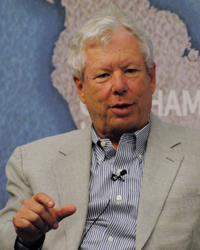Not from me. I find it wonderful that the Nobel Foundation chose Thaler. The economics Nobel has already been awarded to a number of people who can be classified as behavioral economists, including George Akerlof, Robert Fogel, Daniel Kahneman, Elinor Ostrom, and me. With the addition of Thaler, we now account for approximately 6% of all Nobel economics prizes ever awarded.
But many in economics and finance still believe that the best way to describe human behavior is to eschew psychology and instead model human behavior as mathematical optimization by separate and relentlessly selfish individuals, subject to budget constraints. Of course, not all economists, or even a majority, are wedded to this view, as evidenced by the fact that both Thaler and I have been elected president, in successive years, of the American Economic Association, the main professional body for economists in the United States. But many of our colleagues unquestionably are.
I first met Thaler in 1982, when he was a professor at Cornell University. I was visiting Cornell briefly, and he and I took a long walk across the campus together, discovering along the way that we had similar ideas and research goals. For 25 years, starting in 1991, he and I co-organized a series of academic conferences on behavioral economics, under the auspices of the US National Bureau of Economic Research.
Over all those years, however, there has been antagonism – and even what appeared to be real animus – toward our research agenda. Thaler once told me that Merton Miller, who won the economics Nobel in 1990 (he died in 2000), would not even make eye contact when passing him in the hallway at the University of Chicago.
Miller explained his reasoning (if not his behavior) in a widely cited 1986 article called “Behavioral Rationality in Finance.” Miller conceded that sometimes people are victims of psychology, but he insisted that stories about such mistakes are “almost totally irrelevant” to finance. The concluding sentence of his review is widely quoted by his admirers: “That we abstract from all these stories in building our models is not because the stories are uninteresting but because they may be too interesting and thereby distract us from the pervasive market forces that should be our principal concern.” The winner of this year’s Nobel Memorial Prize in Economic Sciences, Richard Thaler of the University of Chicago, is a controversial choice. Thaler is known for his lifelong pursuit of behavioral economics (and its subfield, behavioral finance), which is the study of economics (and finance) from a psychological perspective. For some in the profession, the idea that psychological research should even be part of economics has generated hostility for years.
The winner of this year’s Nobel Memorial Prize in Economic Sciences, Richard Thaler of the University of Chicago, is a controversial choice. Thaler is known for his lifelong pursuit of behavioral economics (and its subfield, behavioral finance), which is the study of economics (and finance) from a psychological perspective. For some in the profession, the idea that psychological research should even be part of economics has generated hostility for years.
Thaler's Work Met With 'Hostility' From Some Economists
October 12, 2017
« Previous Article
| Next Article »
Login in order to post a comment








